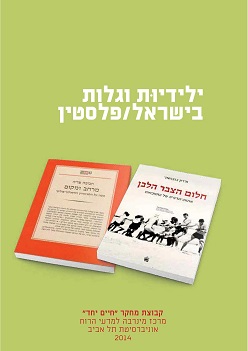A New Publication: Indigeneity and exile in Israel/Palestine (Edited Volume, in Hebrew)
The MHC is delighted to anounce the publication of the editted volume Indigeneity and exile in Israel/Palestine, editted by Shaul Seter, and published by The Living Together group, Minerva Humanities Center, Tel Aviv University, 2014 (in Hebrew).
Read the volume here

In June 2013, the Minerva Humanities Center held a public event discussing two recently published Hebrew books: Meron Benvenisti’s The Dream of the White Sabra (Keter, 2012) and Haviva Pedaya’s Space and Place: An Essay on the Theological-Political Unconscious (Ha-kibutz ha-me’uchad, 2011). These two books, written by well-known scholars, intervene in contemporary Israeli public debate and aim to redirect it. They both examine this place – questioning the territory, regime, society, and culture in contemporary Israel/Palestine; and this time – a time of dramatic change in the representative image of Israeliness, and a time of deep crisis in Israeli political culture. Yet, these two books deviate from mainstream public discourse – not only in content but also in form; they ask us to rethink the very framing of our most urgent political and social questions. Instead of proposing yet another comprehensive political solution to the Israeli-Palestinian conflict – whether in the form of two national states or one binational state – the two books refuse to take the regime’s point of view: Benvenisti asks us to replace the final decision on borders and sovereignty with the insistence on political equality, human dignity, mutual recognition and justice, found at the heart of the binational thinking (and not “solution”); and Pedaya considers binationalism as a critical category, calling for an understanding of the Israeli present through exilic Jewish history and from an Eastern perspective. The two books urge us to leave the national perspective organizing the thinking of and about Israel/Palestine, and suggest, instead, the categories of natives and exiles as an opening for a different cultural-political debate.
The volume consists of five essays discussing the challenges raised in these two books:
Loyalty to and Betrayal of Zionism / Raef Zreik on Benvenisti’s book
On Natives, Specters, and Shades of Ruins / Honaida Ghanim on Benvenist’s book
The Son’s Revolt against His Father and the Politics of Hidden Identities / Pnina Motsafi-Haller on Benvenisti and Pedaya’s books
Netivot: A Place of Identity / Haim Yacobi on Pedaya’s book
Against the Colonialism of the Symbolic / Shaul Setter on Pedaya’s book

